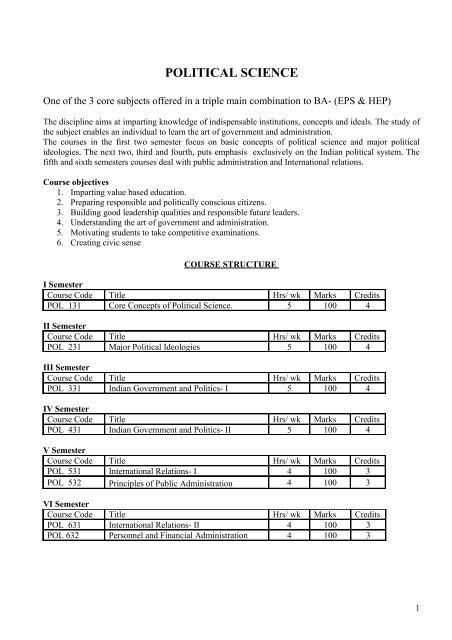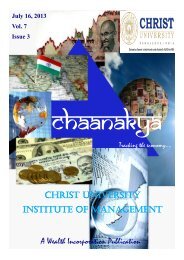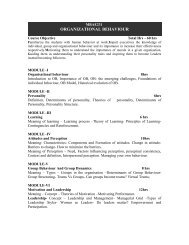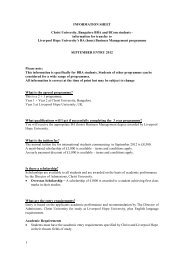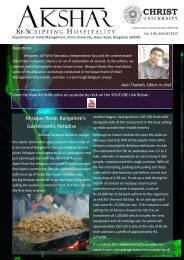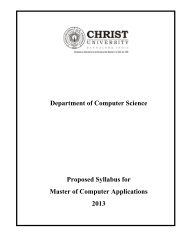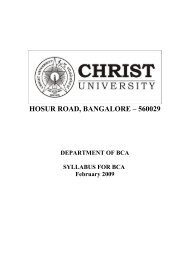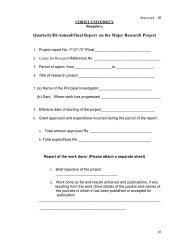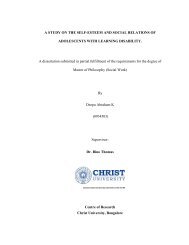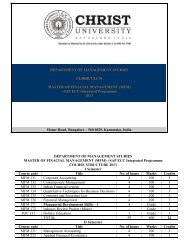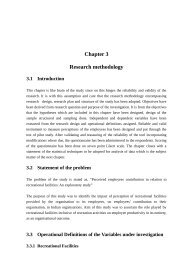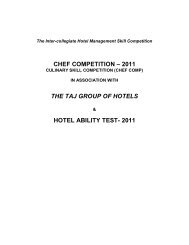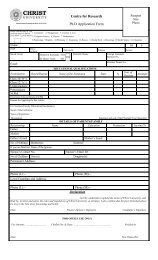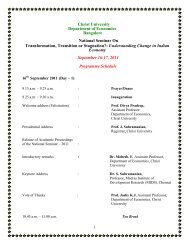Download Political Science Syllabus here - Christ University
Download Political Science Syllabus here - Christ University
Download Political Science Syllabus here - Christ University
Create successful ePaper yourself
Turn your PDF publications into a flip-book with our unique Google optimized e-Paper software.
POLITICAL SCIENCEOne of the 3 core subjects offered in a triple main combination to BA- (EPS & HEP)The discipline aims at imparting knowledge of indispensable institutions, concepts and ideals. The study ofthe subject enables an individual to learn the art of government and administration.The courses in the first two semester focus on basic concepts of political science and major politicalideologies. The next two, third and fourth, puts emphasis exclusively on the Indian political system. Thefifth and sixth semesters courses deal with public administration and International relations.Course objectives1. Imparting value based education.2. Preparing responsible and politically conscious citizens.3. Building good leadership qualities and responsible future leaders.4. Understanding the art of government and administration.5. Motivating students to take competitive examinations.6. Creating civic senseCOURSE STRUCTUREI SemesterCourse Code Title Hrs/ wk Marks CreditsPOL 131 Core Concepts of <strong>Political</strong> <strong>Science</strong>. 5 100 4II SemesterCourse Code Title Hrs/ wk Marks CreditsPOL 231 Major <strong>Political</strong> Ideologies 5 100 4III SemesterCourse Code Title Hrs/ wk Marks CreditsPOL 331 Indian Government and Politics- I 5 100 4IV SemesterCourse Code Title Hrs/ wk Marks CreditsPOL 431 Indian Government and Politics- II 5 100 4V SemesterCourse Code Title Hrs/ wk Marks CreditsPOL 531 International Relations- I 4 100 3POL 532 Principles of Public Administration 4 100 3VI SemesterCourse Code Title Hrs/ wk Marks CreditsPOL 631 International Relations- II 4 100 3POL 632 Personnel and Financial Administration 4 100 31
BA SEMESTER IPOL 131: POLITICAL SCIENCE PAPER I – CORE CONCEPTS OF POLITICAL SCIENCEThis course deals with basic concepts of political science such as state, government, law, rights etc.ObjectivesTo introduce the students to:• The concepts of political science and politics.• The theories of origin of state.• The rights, law, justice, duties of citizens etc.75 HrsModule I<strong>Political</strong> <strong>Science</strong>: Meaning, Nature, Scope and Importance. Methods of Study of <strong>Political</strong> <strong>Science</strong>.16 HrsModule IIState: Meaning, definition and elements of state. Origin of state - Theories - Divine, Social Contract(Hobbs, Rousseau and Locke) and Evolutionary.State Sovereignty: Meaning, characteristics and kinds. Theories - Monism and Pluralism. State Sovereigntyin the age of globalization.State and civil society.24 HrsModule IIILaw: Meaning, Sources and Kinds. Law and Liberty.Liberty, Equality and Justice. Inter-relationships.Rawl’s theory of Justice15 HrsModule IVRights and Duties: Meaning and kinds-Civil, Economic and <strong>Political</strong>. Human rights and their safeguards.Duties of citizens towards the state.12 HrsModule VBehavioralism and Post-Behavioralism. Modernism and Post – Modernism.8 Hrs2
Course Texts:1. Kapur, A C – Principles of <strong>Political</strong> <strong>Science</strong> – S Chand Publications, 2006.2. Gokale B K – A Study of <strong>Political</strong> Theory – Himalaya Publishing House, 20053. Bhagwan V & Bhushan V – <strong>Political</strong> Theory – Principles and Concepts –Sterling Publications, 2006.Recommended Reading:1.Johari J C – Contemporary <strong>Political</strong> Theory – Sterling Publications, 2003.2.Laski H J – Grammar of Politics – London George Allan and Unvim Ltd, 2005.3.Garner – <strong>Political</strong> <strong>Science</strong> and Government – World Press, 20054.Amal Ray & Mohit Bhattacharya – <strong>Political</strong> Theory, World Press, 2005.5.Mahajan V D – <strong>Political</strong> Theory – S Chand Publications, 2004.6.Agarwal R C – <strong>Political</strong> Theory – S Chand Publications, 20067.Andrew Heywood – <strong>Political</strong> Theory an Introduction, Palgrave Macmillan 2000.8. Andrew Heywood – <strong>Political</strong> Ideologies, Palgrave Macmillan 2003.Journals:Indian Journal of <strong>Political</strong> <strong>Science</strong>, Economic and <strong>Political</strong> weekly, Seminar,American <strong>Political</strong> <strong>Science</strong> Review.3
BA SEMESTER IIPOL 231: POLITICAL SCIENCE PAPER II – MAJOR POLITICAL IDEOLOGIES75 HrsThis course mainly throws light on important ideologies being followed by the countries of the world. Italso deals exclusively with Gandhian principles and its relevance in the present day world.Objectives:To introduce the students to:• The concepts and ideologies such as Capitalism, Socialism, Communism, Gandhism and Neo –Imperialism and Democracy.Module IIdeology: Meaning and importance. Liberalism – Classical, modern. Neo-liberal and libertinism .16 HrsModule IISocialism: Evolution, Growth and Forms – Utopian, Fabian, Democratic and Scientific. Similarities andDisparities between socialism and communism. Socialism and Communism in the age of globalization.19 HrsModule IIIDemocracy: Evolution, Growth and Theories of Democracy. Representative democracy – territorial,minority, proportional and functional. Direct democracy checks. Challenges before democracy.20 HrsModule IVGandhism: Basic principles with specific reference to Sarvodaya.Module VKey Issues: Neo Imperialism. Dependency theories. End of ideology debate.10 Hrs10 Hrs4
Course Texts:1.Kapur, A C – Principles of <strong>Political</strong> <strong>Science</strong> – S Chand Publications, 2006.2.Gokale B K – A Study of <strong>Political</strong> Theory – Himalaya Publishing House, 2006.3.Bhagwan V & Bhushan V – <strong>Political</strong> Theory – Principles and Concepts – Sterling Publications, 2006.Recommended Reading:1.Johari J C – Contemporary <strong>Political</strong> Theory – S Chand Publications, 2005.2.Laski H J – Grammar of Politics – London George Allan and Unvim Ltd, 2003.3.Garner – <strong>Political</strong> <strong>Science</strong> and Government – World Press, 2003.4.Amal Ray & Mohit Bhattacharya – <strong>Political</strong> Theory, 2005.5.Mahajan V D – <strong>Political</strong> Theory – S Chand Publications, 2006.6.Agarwal R C – <strong>Political</strong> Theory – S Chand Publications, 2006.7.Verma S P – Modern political theory8.Deol – Liberalism and Marxism9.Andrew Heywood – <strong>Political</strong> Ideologies, Pal Grave Mac Millan,2003.10.Andrew Heywood – Introduction To <strong>Political</strong> Theory, Pal Grave Mac Millan,2003.11.Raju Bhargava – <strong>Political</strong> Theory.Journals:American <strong>Political</strong> <strong>Science</strong> Review, Economic and <strong>Political</strong> Weekly and Seminar5
BA SEMESTER IIIPOL 331: POLITICAL SCIENCE PAPER III – INDIAN GOVERNMENT AND POLITICS-I75 HrsThis Course deals with Indian polity. Its study involves gaining theoretical and practical knowledge ofIndian political system, both central and state.Objectives:To introduce the students to:• The nature, structure and the working of the Indian <strong>Political</strong> System.• Topics like Cooperative Federalism, Decline of Legislature and Parliamentary and PresidentialForms of Government.Module IMajor Constitutional Developments: 1909, 1919, 1935 and 1947 Acts. Framing of the Constitution.Constituent assembly. Preamble and salient features. Basic Structure.16 HrsModule IIKey Concepts: Citizenship, Fundamental Rights and Duties. Directive Principles of State Policy.12 HrsModule IIIUnion and State Legislature: Composition, powers and functions. Presiding officers. Law making process.Committee system. Decline of Legislatures and reforms.18 HrsModule IVUnion and State Executive: President and Vice – President - Method of election, powers and functions.Prime Minister and the Council of Ministers - powers and functions. Governor, Chief Minister and Councilof Ministers – Powers and Functions. Parliamentary and Presidential forms of government: debate.20 HrsModule VUnion and State Judiciary: Supreme Court and High Courts - composition and jurisdiction. Judicial review.Public interest litigation and judicial activism. Judicial Reforms.9 Hrs6
Course Texts:1.Basu D D – Introduction to Constitution of India – Wadwah and Company 20062.Pylee M V –Constitu tional Government In India – S Chand Publications 20063.Ghai K K – Indian Constitution – Kalyani Publishers 2005Recommended Reading:1.Austin G – Indian Constitution – Corner stone of a Nation – Oxford <strong>University</strong> Press, 2004.2.Austin G – Working – A democratic Constitution – Oxford <strong>University</strong> Press, 2004.3.Siwach S R – Dynamics of Indian Government and Politics – Sterling Publications, 2003/04.4.Gupta D C – Indian Government and Politics – Vikas Publishing House, 2005.5.Fadiah B L – Dynamics of Indian government and politics, 2005.6.Bhagwan V & Bhushan V – Indian Constitution - Sterling Publishers, 2006.7.Prakash Chandra – Indian Government and Politics , 2005.8.Constituent Assembly Debates.Journals:Indian Journal of <strong>Political</strong> <strong>Science</strong>, Economic and <strong>Political</strong> weekly, Journal of Constitutional Studies.7
BA SEMESTER IVPOL 431: POLITICAL SCIENCE PAPER IV – INDIAN GOVERNMENT AND POLITICS II.75 HrsThe course throws light on theory and practice of Indian federalism and Sarkaria Commission report whichrecommended various valuable changes with respect to center – state relations. It also deals with methodsof amendment and important constitutional amendments. Issues like electoral reforms, party system,regional disparities, etc are also focused.Objectives:To introduce the students to:• The nature and working of Indian federal system.• Procedure of amendment, important amendments and Constitutional and statutory bodies.• The major Contemporary issues in Indian Government and Politics.Module IUnion and State Relations: Unitary and federal features. State autonomy. Sarkaria commission report.19 HrsModule IIMethods of Amendment of the Constitution: Important amendments – 1 st , 24 th , 25 th , 42 nd , 44 th , 52 nd ,73 rd , 74 th , 77 th , 93 rd and 97 th .12 HrsModule IIIConstitutional and Statutory Commissions / Bodies: Planning commission. Finance commission. Backwardclasses commission. National development council, National Commission for Women, MinorityCommission and NCRWC.14 HrsModule IVThe Party System: Features, National and Regional parties. Election: Election Commission- Organizationand Function, Pressure Groups and Public Opinion. Anti-Defection Law.18 HrsModule VKey Issues: Secularism, Communalism, Social Justice and Regional Disparities. Right to Information.12 Hrs8
Course Texts:1.Basu D D – Introduction to Constitution of India – Wadwah and Company 20062.Pylee M V – Constitutional Government In India – S Chand Publications 20063.Ghai K K – Indian Constitution – Kalyani Publishers 2005Recommended Reading:1.Austin G – Indian Constitution – Corner stone of a Nation – Oxford <strong>University</strong> Press, 20042.Austin G – Working – A democratic Constitution – Oxford <strong>University</strong> Press, 2004.3.Siwach S R – Dynamics of Indian Government and Politics – Sterling Publications, 2003/04.4.Gupta D C – Indian Government and Politics – Vikas Publishing House, 2005.5.Fadiah B L – Dynamics of Indian government and politics, 2005.6.Bhagwan V & Bhushan V – Indian Constitution - Sterling Publishers, 2006.7.Prakash Chandra and P– Indian Government and Politics, 2005.8.Hoshiyar Singh –Indian Administration – Kitab Mahal, Allahabad, 2005.9.Constituent Assembly Debates.Journals:Indian Journal of <strong>Political</strong> <strong>Science</strong>, Economic and <strong>Political</strong> weekly, Mainstream Journal of Constitutionaland Parliamentary Studies.9
BA SEMESTER VPOL 531: POLITICAL SCIENCE PAPER V – INTERNATIONAL RELATIONS-I .60 HrsThe paper deals with relations between sovereign independent nations. Its study includes importantconcepts such as National Power, National Interest, Instruments of Foreign policy and approaches tointernational peace.Objectives:To introduce the students to:• The nature, scope and importance of international relations / Politics.• The concept of national power, foreign policy and approaches to international peace.Module IInternational Relations: Meaning, nature, scope and importance. Theories of International Relations –Idealist, Realist and Neo - Realist.13 HrsModule IINational Power and Foreign Policy: Meaning, elements, evaluation of national power. Nature andObjectives of foreign policy, determinants and formulation of Foreign Policy.11 HrsModule IIIInstruments of Foreign Policy: Diplomacy – Nature, Functions, Privileges and Immunities. Types ofDiplomacy. Alliances – During cold war and emerging power alignments in the post cold war period.Economic instruments of foreign policy.14 HrsModule IVWar: Meaning, Nature, Causes, Types and Remedies. Terrorism – Causes, Types, role of State and Non-State actors in terrorism, Combating of terrorism .10 HrsModule VApproaches to International Peace: Balance of Power. Collective Security. Pacific Settlement ofInternational Disputes. Disarmament and arms control: Problems and Issues.12 Hrs10
Course Texts:1. Vinay Kumar Malhotra – International Relation, Anmol Publications Pvt. Ltd., 20052.Srivastava, Joshi, International Politics and Relations, Goel Publishing House, 2006.3.Palmer & Perkins – International Relations, Scientific Book Agency ,2005.Recommended Reading:1. H J Morgenthau – Politics among Nations. – Scientific Book Agency.2. Palmer & Perkins – International Relations, 2006.3. Mahendra Kumar – Theoretical Aspects of International Politics, 2005/06.4. V.P. Dutt, India’s Foreign Policy in a Changing World, New Delhi, Vikas(2003), 2005.5.R.T. Jangam, International Relations, Allied Publishers Pvt. Ltd., 2005.6.Sharma R.R, India and Emerging Asia, Sage Publications, 2005.7.Jasjit Singh, Nuclear India, Knowledge World, New Delhi, 1998.8. Rumki Basu – The United Nations – Sterling Publishers, 2005.9. Gold Stein, International Relations, Pearson education, 2007.10. Kanti Bajpai & Siddartha Mallavarapu, Ed 2005, International Relations, in India: Bringing TheoryBack Home, New Delhi, Orient Longman11.J.N.Dixit, Indian Foreign Policy, 1947 to 2002.12.C.Rajmohan- Crossing Rubicon, New India’s Foreign Policy, Viking Press.Journals:International Studies, India Quarterly, Mainstream, World Focus.11
BA SEMESTER VPOL 532: POLITICAL SCIENCE PAPER V– PRINCIPLES OF PUBLIC ADMINISTRATION.60 HrsThe paper will focus on study of nature, scope and importance of public administration. It focuses onprinciples of administration, organization and the concepts like department, management, control overpublic administration and theory and practice of public administration.Objectives: To introduce the students to:• The meaning, nature and importance of the subject.• The principles of organization, nature and functions of management and nature of public relations.• The concepts like administrative law, new public administration, trends in public administrationlike development administration and good governance.Module IPublic Administration: Meaning, nature, scope and importance. Private and Public administration –differences and similarities. Ecology of public administration – Social, Economic, Cultural and Legal.12 HrsModule IIOrganization: Theories of organization – Mechanistic and Humanistic. Principles of organization –Hierarchy, Unity of Command, Span of Control, Delegation of Authority, Co-ordination, Centralizationand Decentralization ; Departments, Public Corporations, Boards and Commissions. Line, Staff andAuxiliary agencies.16 HrsModule IIIDynamics of Management: Meaning, Nature and Functions of Management. Chief Executive – Powers andFunctions. Leadership – Types and Qualities. Communication – Nature and Types. Planning and PublicRelations.14 HrsModule IVAdministrative Law: Delegated legislation – meaning, growth, merits, demerits and safeguards.Administrative adjudication - meaning, growth, merits, demerits and safeguards.10 HrsModule VTrends in Public Administration: New public administration, Comparative administration. Developmentadministration. Good governance. E – governance.8 Hrs12
Course Texts:1.A.R.Tyagi, Public Administration.2.V.Bhagwan and V.Bhushan- Public Administration. S.Chand Publications.Recommended Reading:1.Awasti and Maheshwari – Public Administration.2.Maheshwari – Public Administration.3.Rumki Basu – Principles of Public Administration.4.F.L.Fadia – Public Administration Theories and Practice.5.Mohith Bhattacharya – Development Administration.6.Karnataka Panchayath Raj Act, 1993 (latest).Journal:Indian Journal of Public Administration.13
BA SEMESTER VIPOL 631: POLITICAL SCIENCE PAPER VI – INTERNATIONAL RELATIONS - II.60 HrsThe course deals with the institutions such as International Law, International Organizations and majorissues of international politics including the foreign policies of major powers. It also throws light on thenature, objectives and recent trends of India’s foreign policy.Objectives:To introduce the students to:• The nature, scope, importance and sanctions of international law.• Role and importance of world organizations.Module IInternational Law: Meaning, nature, scope, importance, sources and sanctions.12 HrsModule IIInternational Organizations: League of Nations. United Nations – Origin, purposes, principles andorganization and working; Achievements, shortcomings and reforms. India and the U.N.16 HrsModule IIIMajor Issues in International Politics: New International Economic Order. North - South and South – Southdialogues. World Trade Organization and state sovereignty. Regional co-operation – European Union(EU), ASEAN, SAARC, African Union.12 HrsModule IVForeign Policy of Major Powers: USA, China and Russia.10 HrsModule VForeign Policy of India: Features, Objectives and Trends. India’s relations with U.S.A, China, Russia andPakistan. Look East Policy, India and the N.A.M.10 Hrs14
Course Texts:1. Vinay Kumar Malhotra – International Relation, Anmol Publications Pvt. Ltd., 20052.Srivastava, Joshi, International Politics and Relations, Goel Publishing House, 2006.3.Palmer & Perkins – International Relations, Scientific Book Agency ,2005.Recommended Reading:1. H J Morgenthau – Politics among Nations. – Scientific Book Agency.2. Palmer & Perkins – International Relations, 2006.3. Mahendra Kumar – Theoretical Aspects of International Politics, 2005/06.4. V.P. Dutt, India’s Foreign Policy in a Changing World, New Delhi, Vikas(2003), 2005.5.R.T. Jangam, International Relations, Allied Publishers Pvt. Ltd., 2005.6.Sharma R.R, India and Emerging Asia, Sage Publications, 2005.7.Jasjit Singh, Nuclear India, Knowledge World, New Delhi, 1998.8. Rumki Basu – The United Nations – Sterling Publishers, 2005.9. Gold Stein, International Relations, Pearson education, 2007.10. Kanti Bajpai & Siddartha Mallavarapu, Ed 2005, International Relations, in India: Bringing TheoryBack Home, New Delhi, Orient Longman11.J.N.Dixit, Indian Foreign Policy, 1947 to 2002.12.C.Rajmohan- Crossing Rubicon, New India’s Foreign Policy, Viking Press.Journals:International Studies, India Quarterly, Mainstream, World Focus.15
BA SEMESTER VIPOL 632: POLITICAL SCIENCE PAPER VI - PERSONNEL AND FINANCIALADMINISTRATION60 HrsThe course mainly deals with the personnel and the financial administration. The budget preparation,execution, types of budget and accountability and control are mainly focused.Objectives:To introduce the students to:• The nature and importance of personnel administration.• Nature and importance of sound financial administration.Module IPersonnel Administration-I: Meaning and importance. Types of Personnel – Aristocratic, Bureaucratic andDemocratic.10 HrsModule IIPersonnel Administration-II: Position Classification. Recruitment, Training, Promotion, Compensation,Morale, Discipline, Rights and Duties of Civil Servants, Retirement.8 HrsModule IIIFinancial Administration: Budget – Nature and Principles. Budgetary process - .Preparation, Enactmentand Execution. Performance Budget. Zero Based Budget.16 HrsModule IVAccountability and Control: Nature and Importance. Forms of Control – Legislative, Executive, Judicialand Popular. Ombudsman – Origin and growth. Lokpal and Lokayuktha (With Reference to India).16 HrsModule VLocal Governments: Nature and Objectives of Local Governments. Urban and Rural Local Bodies (withspecial reference to Karnataka).10 Hrs16
Course Texts:1.A.R.Tyagi, Public Administration.2.V.Bhagwan and V.Bhushan- Public Administration. S.Chand Publications.Recommended Reading:1.Awasti and Maheshwari – Public Administration.2.Maheshwari – Public Administration.3.Rumki Basu – Principles of Public Administration.4.F.L.Fadia – Public Administration Theories and Practice.5.Mohith Bhattacharya – Development Administration.6.Karnataka Panchayath Raj Act, 1993 (latest).Journal:Indian Journal of Public Administration.17
Mid Semester Question paper patternSection A: 3 questions to be answered out of 5. 3 X 5=15(In not less than 60 words each)Section B: 2 questions to be answered out of 3.(In not less than 150 words each) 2x10=20Section C: 1 question to be answered out of 2.(In not less than 400 words) 1x15=15Time 2 Hrs Total marks 50End Semester Question Paper PatternSection “A”: 6 questions to be answered out of 8. 6X5=30(In not less than 60 words each)Section “B”: 4 questions to be answered out of 6.(In not less than 150 words each) 4X10=40Section “C”: 2 questions to be answered out of 3.(In not less than 400 words each) 2X15=30Time 3 Hrs Total marks: 100Evaluation PatternEnd Semester Examination100 Marks, 3 Hrs(Reduced to 50 marks)CIA 1 – Mid semester examination 50 Marks, 2 HrsCIA 2 – Assignment 10 Marks (To Be in 20 marks)CIA 3 – Activities 10 Marks (To Be in 20 marks)Attendance5 MarksTotal 50 MarksESE + CIA’s = 50+50 = 100(Of this 40% is minimum pass percentage)18


